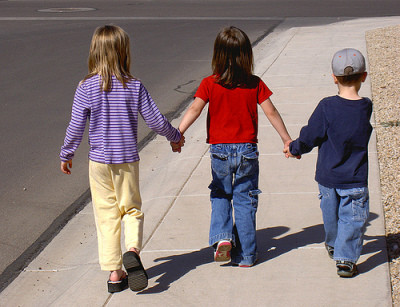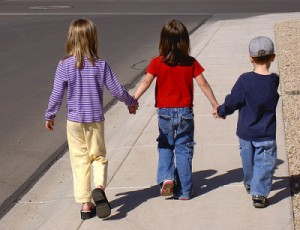
 The kind of experiences that children have at important stages in their life and the environment within which they have these experiences is what helps in shaping the kind of person they become later in life. Although Family and School Environments together play an important role in the all round development of Children as a whole, nevertheless the kind of people they interact with or their friend’s circle too has an impact on the kind of people they become.
The kind of experiences that children have at important stages in their life and the environment within which they have these experiences is what helps in shaping the kind of person they become later in life. Although Family and School Environments together play an important role in the all round development of Children as a whole, nevertheless the kind of people they interact with or their friend’s circle too has an impact on the kind of people they become.
As children grow up they tend to spend more time with their peers because of the commonalities between their peers due to the similarities in their ages. Naturally, their views or thinking, their understanding of things are all along similar grounds therefore they are able to relate to each other better in comparison to their parents or siblings. The conflict that most children face with their siblings and parents are high because of the differences in the age and the thought processes, as compared to their peers. Thus they tend to spend considerable amount of time with like-minded individuals.
Children begin their stepping stones into the social environment from their immediate families; however, as they grow and mature they are introduced to the social world of peers where they spend increasing amounts of time with kids their own age according to Gary Ladd a professor in psychology and Human Development at the Arizona State University. Apart from this, “The types of relationships they form differ from those they have with parents and siblings which teach them unique skills that impact their development. Peer relationships are more balanced and tend to bring similar levels of ability, reasoning and skill to their interactions” says Ladd.
The behaviour of children with their peers is often influenced by what they learn from their immediate family. Children tend to replicate their parents behaviour in an attempt to be just like them; at a tender age they pick up almost everything from their parents and siblings through keen observation. Therefore, the behaviour that they display usually mimics what they have seen at home. For instance if parents engage in coercive behaviour, their children are more likely to do the same; likewise, if parents teach their children empathy, they are more likely to take their friends’ feelings into consideration.
Apart from relating easily to each other they also acquire a wide range of behaviours, skills, attitudes and experiences that influence their behaviour and their perception of things. Their experiences with peers affect their social, emotional and cognitive functioning beyond the influences of family, school and neighbourhood.
Amongst the many experiences they have they also experience peer acceptance and rejection, friendship development, school adjustment, bullying, self-esteem, loneliness and the roles that gender differences, emotions and culture, play in peer relations is learnt as well.
As early as preschool, children are faced which challenges like making a new friend, maintaining existing friendships, fitting into peer groups and avoiding bullies; all of these interpersonal skills require both complex thinking and behavioural skills, according to Ladd and can be developed with peers.
Some of the skills children learn through their peer relationships include assertiveness, conflict management, how to earn respect and control aggression. There have been various studies that indicate how play with peers provides children with important opportunities to discuss feelings, expand their thought processes and knowledge and experiment with language and social roles.
The kind of friend’s circle that they choose is dependent on the environment that they come from such as the family and the neighbourhood they are residing in along with their innate attributes. Therefore you find some kids being motivated to have a few good friends, some who like being a part of large groups while some are naturally aggressive and some are passive.
While having friends is good it also has its drawbacks if the friend circle that your child is interacting with is influencing your child in a negative way rather than positive influences. According to Ladd “Children who are very shy or anxious or if they are overly aggressive often get caught up in bully-victim relationships that have negative impacts on both children. Even children with social difficulties tend to be excluded from everyday peer activities and experience feelings of discomfort, sadness and alienation. Adverse peer experiences can be stressful for children and if persistent, can lead to feelings of anxiety, depression and loneliness.”
Therefore it is essential for parents to monitor the group that their child interacts with on a regular basis, to ensure that they have the appropriate friends. Parents wishing to help their child make the appropriate kind of friends need to sit down with their child and discuss their views and highlight why they think that their child’s friend circle isn’t the appropriate kind, similarly if their child is having problems with making friends they can teach children prosocial peer interaction skills. And to top it all they can teach children forgiveness and empathy and also teach them to be accepting of individual differences. These are the some of the ways that parents can avail of in an attempt to help their child develop appropriate peer relations that have a positive impact on their child’s development, in the long run.
